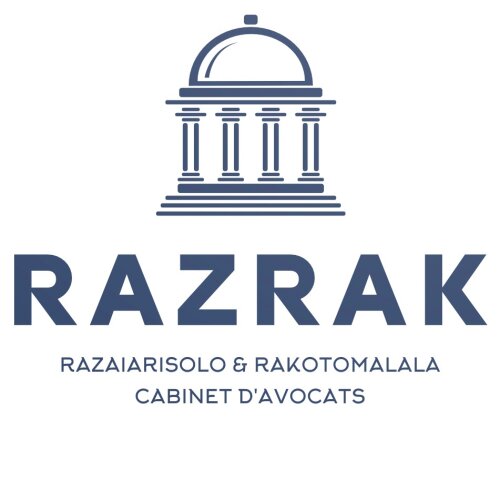Best ADR Mediation & Arbitration Lawyers in Madagascar
Share your needs with us, get contacted by law firms.
Free. Takes 2 min.
Or refine your search by selecting a city:
List of the best lawyers in Madagascar
About ADR Mediation & Arbitration Law in Madagascar
Alternative Dispute Resolution (ADR) encompasses a variety of methods, including mediation and arbitration, designed to resolve disputes outside of traditional court litigation. In Madagascar, ADR is increasingly recognized as an efficient way to handle disputes, reflecting both traditional conflict resolution practices and modern legal frameworks. This approach is useful in addressing matters ranging from commercial disputes to interpersonal conflicts. While still developing, Madagascar’s legal environment is progressively aligning with international norms in ADR practices.
Why You May Need a Lawyer
There are several situations where legal assistance in ADR mediation and arbitration might be required in Madagascar:
- If you are involved in a business conflict or contractual dispute, a lawyer with ADR expertise can guide you through mediation or arbitration processes.
- When disputes arise in family matters or succession planning, professionals can help mediate a fair agreement.
- If you are a foreign investor or entity looking to resolve commercial disputes, understanding the local ADR landscape is vital.
- Understanding the legal technicalities specific to ADR clauses in contracts involves navigating complex legal requirements, which a lawyer can clarify.
Local Laws Overview
The ADR landscape in Madagascar is guided by a mix of traditional dispute resolution practices and procedural mandates set by the legal system. Some key aspects include:
- Mediation is often preferred for its informal and non-binding nature, aiming for amicable settlements.
- Arbitration in Madagascar is governed by laws that align with international standards but require an understanding of local legal specificities.
- Specific legal frameworks encourage ADR in commercial and civil matters, facilitating quicker resolutions.
- Madagascar’s courts may sometimes require mediation before certain cases can proceed to trial.
- The role of third-party neutrals, such as mediators and arbitrators, is increasingly formalized within the legal system.
Frequently Asked Questions
What is the difference between mediation and arbitration?
Mediation involves a neutral third party facilitating negotiation to help parties reach a mutual agreement, while arbitration involves a neutral party who listens to both sides and then makes a binding decision.
Is ADR mandatory before going to court in Madagascar?
For some types of disputes, particularly in civil and commercial matters, ADR may be encouraged or required before a case can proceed in court.
How long does the ADR process typically take?
The duration varies depending on the complexity of the dispute and the willingness of parties to reach an agreement, but it often resolves quicker than traditional litigation.
Are ADR decisions enforceable in Madagascar?
Yes, particularly arbitration awards can be legally binding and enforceable under national and international law.
Can I choose any arbitrator or mediator for my case?
Parties typically agree on an arbitrator or mediator. In cases of disagreement, an appointing authority or institution may select one.
What costs are involved in ADR proceedings?
Costs can include fees for mediators or arbitrators, administrative costs, and legal fees, but ADR is generally less expensive than court litigation.
Do I need a lawyer for ADR processes?
While not mandatory, a lawyer’s guidance can be beneficial in understanding legal intricacies and ensuring your interests are represented.
Can ADR processes remain confidential?
Yes, ADR is known for its confidentiality which is one of its main advantages over public court proceedings.
What happens if ADR does not resolve the dispute?
If ADR fails, parties may still choose to pursue litigation in court to resolve the dispute.
Are ADR practices recognized internationally?
Yes, ADR practices in Madagascar are increasingly in line with international standards, particularly arbitration.
Additional Resources
Consider reaching out to the following resources for more information or assistance:
- Ministry of Justice in Madagascar - for information on local laws and regulations.
- Chamber of Arbitration - offers a framework for arbitration proceedings.
- Local Bar Associations - can provide referrals to qualified ADR professionals.
- International Arbitration Institutions - for cross-border dispute resolution procedures.
Next Steps
If you require legal assistance in ADR mediation and arbitration, begin by consulting with a legal advisor experienced in this field. They can offer guidance tailored to your specific circumstances. Prepare by gathering all relevant documentation and understanding your desired outcomes. You may also want to contact the recommended resources or institutions for authoritative guidance on your specific situation.
Lawzana helps you find the best lawyers and law firms in Madagascar through a curated and pre-screened list of qualified legal professionals. Our platform offers rankings and detailed profiles of attorneys and law firms, allowing you to compare based on practice areas, including ADR Mediation & Arbitration , experience, and client feedback.
Each profile includes a description of the firm's areas of practice, client reviews, team members and partners, year of establishment, spoken languages, office locations, contact information, social media presence, and any published articles or resources. Most firms on our platform speak English and are experienced in both local and international legal matters.
Get a quote from top-rated law firms in Madagascar — quickly, securely, and without unnecessary hassle.
Disclaimer:
The information provided on this page is for general informational purposes only and does not constitute legal advice. While we strive to ensure the accuracy and relevance of the content, legal information may change over time, and interpretations of the law can vary. You should always consult with a qualified legal professional for advice specific to your situation.
We disclaim all liability for actions taken or not taken based on the content of this page. If you believe any information is incorrect or outdated, please contact us, and we will review and update it where appropriate.
Browse adr mediation & arbitration law firms by city in Madagascar
Refine your search by selecting a city.










